Ianadmin
BC Hydro Power Smart Program boosts viability for mechanical pulp producers
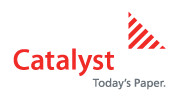 Catalyst Paper (TSX:CYT) has announced that the Ministry of Energy and Mines and BC Hydro have introduced a new energy efficiency program aimed at reducing the power costs of mechanical pulp producers. The Power Smart program provided an injection of $100 million over three years and is aimed at reducing energy intensity and improving energy efficiency used in the thermal-mechanical pulping process at seven pulp facilities throughout British Columbia.
Catalyst Paper (TSX:CYT) has announced that the Ministry of Energy and Mines and BC Hydro have introduced a new energy efficiency program aimed at reducing the power costs of mechanical pulp producers. The Power Smart program provided an injection of $100 million over three years and is aimed at reducing energy intensity and improving energy efficiency used in the thermal-mechanical pulping process at seven pulp facilities throughout British Columbia.
This funding will benefit our three mills located in the communities of Crofton, Port Alberni and Powell River. The first project that Catalyst is in the advanced stages of planning for is a project in Powell River that utilizes waste steam to reduce our electrical load on the BC Hydro system. The project has an expected capital cost in excess of $25 million of which Power Smart funding will cover 75% and reduces energy cost by an estimated $5 million annually. "We are pleased with this outcome after several months of open dialogue examining all sides of this complex situation," says Catalyst President and CEO Joe Nemeth. "This program improves the viability of the energy-intensive mechanical pulping industry and will help ensure the economic benefits we generate throughout the province will continue."
In addition to more than one million tonnes of paper, Catalyst produces 355,000 tonnes of pulp sold to customers in Asia, consuming an annual capacity of approximately 3.5 million gigajoules of energy in the process. Catalyst plans to leverage the Power Smart program by upgrading equipment to efficiently harness energy, reducing its energy waste and load on BC Hydro's system.
Catalyst Paper manufactures diverse specialty mechanical printing papers, newsprint and pulp. Its customers include retailers, publishers and commercial printers in North America, Latin America, the Pacific Rim and Europe. With three mills, located in British Columbia, Catalyst has a combined annual production capacity of 1.5 million tonnes. The company is headquartered in Richmond, British Columbia, Canada and is ranked by Corporate Knights magazine as one of the 50 Best Corporate Citizens in Canada.
SOURCE: Catalyst Paper Corporation
Successful Start-up of World’s Largest TENCEL®¹ Production Plant in Lenzing
First sales volumes already successfully marketed
Technological milestone for TENCEL®, the fiber of the future
The TENCEL® production plant secures 140 jobs at the Lenzing site
Investment costs of EUR 150 mn and construction time of 24 months fully on schedule
 The Lenzing Group has successfully initiated production at its new TENCEL® jumbo production facility, the largest in the world, at the Lenzing site in Upper Austria. The plant is in the midst of a stable ramp-up phase. The feedback on the part of the market is very positive.
The Lenzing Group has successfully initiated production at its new TENCEL® jumbo production facility, the largest in the world, at the Lenzing site in Upper Austria. The plant is in the midst of a stable ramp-up phase. The feedback on the part of the market is very positive.
“We are more than satisfied with the progression of the start-up curve. Based on the production process in the past days and weeks, we have reasonable grounds to believe that this latest generation of TENCEL® technology will completely fulfill our expectations”, says a confident Lenzing Chief Executive Officer (CEO) Peter Untersperger. “The successful start-up of production operations is a technological milestone for TENCEL®, the fiber of the future, and for the entire Lenzing Group. We are optimistic that we will be able to achieve the planned production target of 30,000 tons by the end of 2014. This new TENCEL® facility is decisive to ensure the long-term viability of fiber production at the Lenzing site and the basis for future investments in all markets”, adds Lenzing’s Chief Operating Officer (COO) Friedrich Weninger.
This factory comprises the first time in which a single production line with an annual nominal capacity of 67,000 tons was installed. Previous TENCEL® production lines were usually only one-quarter as large. The new plant design incorporates lessons learned from the longstanding experience of three existing Lenzing Group TENCEL® production plants located in Austria, USA and Great Britain. As a consequence, the new TENCEL® plant in Lenzing represents the world’s leading generation of TENCEL® technology. The new design of the jumbo production line also enables investment costs to be maintained at a very competitive level of approximately EUR 150 mn (about EUR 2,200 per ton of capacity). This comprises the decisive approach to the further competitive scaling of TENCEL® fibers as a universally deployable textile and nonwoven fiber. The new, broader product portfolio on the basis of the TENCEL® technology successfully complements Lenzing’s specialty strategy.
With a construction time of 24 months, Lenzing completely adhered to both the budgeted investment costs as well as all timetables. The TENCEL® production in Lenzing secures 140 jobs at the Lenzing site.
Thanks to the new plant, annual nominal TENCEL® production capacity of the Lenzing Group will rise from 155,000 tons p.a. to about 220,000 tons. In this way Lenzing will further expand upon its global market leadership for TENCEL® fibers and offer its global customers new expansion opportunities in both the textile and nonwovens segments as well as new and innovative applications. “The related market development activities have already been in full swing for quite a few months”, states Robert van de Kerkhof, the Chief Commercial Officer (CCO) of Lenzing responsible for the fiber business. Moreover, new technical applications will be opened up and massively expanded in the years to come.
TENCEL® - the fiber of the future
TENCEL® is the latest generation of man-made cellulose fibers, and is manufactured in a particularly environmentally-compatible production process awarded the “European Award for the Environment” by the European Union. Lenzing is the only industrial-scale supplier of TENCEL® in the world. TENCEL® fibers are used by the textile industry as well as for nonwovens. Typical applications of the high-tech fiber TENCEL® include sportswear, soft denim applications, home textiles as well as baby wipes and cosmetic wipes. However, TENCEL® is also being increasingly deployed for technical applications. For example, as a powder added to construction materials, TENCEL® ensures a pleasant indoor climate.
ANDRITZ GROUP: solid business development in the first half of 2014
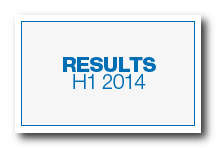 International technology Group ANDRITZ showed solid business development in the first half of 2014 in a still challenging overall economic environment.
International technology Group ANDRITZ showed solid business development in the first half of 2014 in a still challenging overall economic environment.
- Sales increased slightly to 2,659.4 MEUR in the first half of 2014 (+1.9% versus H1 2013: 2,610.1 MEUR); this increase is attributable to the Schuler Group, which only contributed four months to the previous year’s reference period (first-time consolidation as of March 1, 2013). Sales in the second quarter of 2014, at 1,439.9 MEUR, almost reached the reference figure of last year (-0.4% versus Q2 2013: 1,446.3 MEUR).
- The order intake amounted to 2,980.2 MEUR in the first half of 2014 and was thus well above the previous year’s reference figure (+18.0% versus H1 2013: 2,526.0 MEUR). This significant increase is mainly due to the good order intake in the PULP & PAPER and METALS business areas in the first quarter of 2014. The order intake in the second quarter of 2014, at 1,238.0 MEUR, was practically unchanged compared to the level in the second quarter of 2013 (1,237.7 MEUR).
- As of June 30, 2014, the order backlog amounted to 7,555.7 MEUR which is an increase of 2.3% compared to the end of last year (December 31, 2013: 7,388.5 MEUR).
- In the first half of 2014, the EBITA amounted to 133.4 MEUR (+37.7% versus H1 2013: 96.9 MEUR) and the EBITA margin was 5.0% (H1 2013: 3.7%). Thus, earnings were significantly above the low reference figure for the previous year, which was strongly negatively impacted in the first quarter of 2013 by high provisions booked for a pulp mill project in South America. In the second quarter of 2014, the EBITA amounted to 84.8 MEUR and was thus 2.5% above the figure for the second quarter of 2013 (82.7 MEUR). The EBITA margin slightly increased to 5.9% (Q2 2013: 5.7%).
- The net income reached 66.7 MEUR in the first half of 2014 and was thus well above the very low reference figure for the previous year (+42.2% versus H1 2013: 46.9 MEUR).
ANDRITZ President and CEO Wolfgang Leitner: “Given the overall economic situation and the competitive environment, order intake and sales of the ANDRITZ GROUP saw solid development. We achieved a significant improvement in earnings compared to the previous year’s reference period, although further improvements are necessary to reach our target figures. We expect unchanged project activity in the markets we serve for the current second half of the year.”
Based on the business development so far, the order backlog, and – compared to 2013 – additional two months sales contribution by the Schuler Group, ANDRITZ expects a slight rise in sales in the 2014 business year compared to the previous year. Net income is expected to show a significant improvement compared to the low level of 2013.
emtec at the PTS Paper and Board Symposium
emtec Electronic appears in Munich
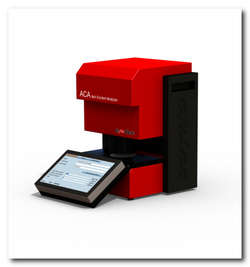 In September, emtec Electronic GmbH appears at the PTS Paper and Board Symposium in the congress hall in Munich, Germany. On September 17th and 18th, 2014 it is possible to have a look at the PDA.C 02 – Penetration Dynamics Analyzer, which characterizes the properties of paper and board surfaces for converting (coating, printing, glueing).
In September, emtec Electronic GmbH appears at the PTS Paper and Board Symposium in the congress hall in Munich, Germany. On September 17th and 18th, 2014 it is possible to have a look at the PDA.C 02 – Penetration Dynamics Analyzer, which characterizes the properties of paper and board surfaces for converting (coating, printing, glueing).
But also the innovative ACA – Ash Content Analyzer will be showcased. Within seconds it delivers, beside the total ash content, the percentage of the single fillers and minerals in paper and board. Therefore, the ACA serves as a replacement of the traditional, time-consuming combustion method.
Mapal GE adapts FFBA technology for pulp and paper manufacturers
Are bubbles the answer to treating wastewater in the pulp and paper industry?
 Pulp and paper making is renowned as one of the most water intensive industrial production processes anywhere. Processing pulp requires huge quantities of water to deliver a consistent structure. The constituents of paper are processed into a sludge form and with water used at almost every stage of production, the result is the generation of a high quantity of highly contaminated level of wastewater which has to be treated to meet regulatory and environmental consents.
Pulp and paper making is renowned as one of the most water intensive industrial production processes anywhere. Processing pulp requires huge quantities of water to deliver a consistent structure. The constituents of paper are processed into a sludge form and with water used at almost every stage of production, the result is the generation of a high quantity of highly contaminated level of wastewater which has to be treated to meet regulatory and environmental consents.
Some estimates suggest up to 17.4 cubic metres of water are required to produce one metric tonne of paper, with the raw wastewaters from pulp and paper and board mills often requiring complex biological treatment processes. It’s a challenge the industry has embraced however, with around 92% of the water used returned to the environment, after it has been treated. The filtering and removal of contaminants from the wastewater can be very energy demanding, with mechanical surface aeration and sub-surface jet aeration systems for biological treatment, known to consume high volumes of electricity. Energy reduction, operational cost reduction and water recycling initiatives are therefore important objectives for many paper manufacturers.
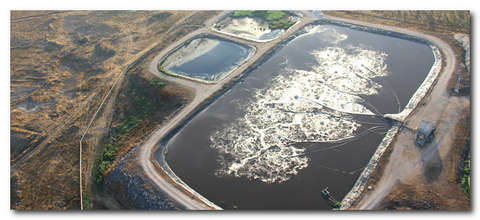
In pulp and paper mills, waste water treatment can take on several forms, from filtering through to biological treatment process. For biological treatment to be effective, the waste water needs to be effectively aerated,
Many UK mills will use mechanical surface aeration techniques in order to supply the required oxygen for bacteria to achieve an aerobic biological treatment, especially where an activated sludge process is involved. However, mechanical surface aerators are typically expensive to operate and maintain, old, prone to breakdown, due to the number of moving parts andhave considerable energy consumption, all of which adds up to relatively high operating costs.
Enter Mapal Green Energy with its innovative Floating Fine Bubble Aeration technology (FFBA), currently used by Anglian Water with further deals signed with Thames Water and United Utilities for systems to go live before the end of the year, where Mapal GE’s equipment will be used to treat domestic and industrial wastewater in a range of lagoons and reactors. The same technology has also been deployed successfully in South Africa in the pulp and paper sector and again in factory farming installations in Israel, where the challenges of treating aggressive and hazardous liquids echo many of the issues faced in the pulp and paper industry.
A revolutionary solution, floating fine bubble aeration approaches the challenge of wastewater oxygenation by marrying the strengths of mechanical surface aeration technology – easy to install and accessible for maintenance - with the efficiency which is derived from sub surface fine bubble aeration systems. With no moving parts generating friction and driving high energy consumption, a key benefit for users of Mapal Green Energy’s floating fine bubble aeration system is its dramatically reduced energy bill. Tests around the world have shown that in some cases, compared to mechanical surface aeration, a plant’s energy consumption can be reduced by up to 70% using the Mapal system, with savings of 50% regularly achieved.
Commenting on the ease of installation of the system, Mapal’s UK sales manager Andy Carling said, “By substituting a surface mounted propeller for a system of blowers and fine bubble diffusers, not only is energy consumption reduced, but installation and maintenance is dramatically simplified. The system does not require a tank to be drained, nor does it need to be attached to a concrete floor. Aerators are automatically adjustable to water depth and because they float, are always level, thus delivering an even flow of oxygen within the reactor.”
Mapal’s units are made from robust stainless steel, so have a long life and as a modular system, the installation can be added to or taken away from quickly and easily.
A technology which is creating waves amongst the UK’s water utilities looks set to revolutionise wastewater treatment in selected sectors of the pulp and paper industry too.
For details of Mapal Green Energy’s floating fine bubble aeration technology, please visit http://www.mapal-ge.com
ABB commissions new Quality Control System at Burrows Paper Corporation’s Mohawk Valley mill
Replacement of existing Quality Control System will help specialty mill in Little Falls, NY consistently produce high quality paper through increased visibility and control of the papermaking process
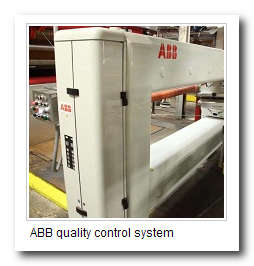 ABB, the leading power and automation technology group has successfully commissioned a new Quality Control System (QCS) at Burrows Paper Corporation’s Mohawk Valley Paper Mill in Little Falls, New York. The system is a replacement of the original ABB QCS that had been in place for the last 25 years. The new system was commissioned in April 2014.
ABB, the leading power and automation technology group has successfully commissioned a new Quality Control System (QCS) at Burrows Paper Corporation’s Mohawk Valley Paper Mill in Little Falls, New York. The system is a replacement of the original ABB QCS that had been in place for the last 25 years. The new system was commissioned in April 2014.
Installed on the mill’s paper machine, PM12, the new QCS system will help maintain superior product quality by providing better sensing and control of the paper machine, and automated grade change capability that will improve efficiency when making short runs of specialty products. It will also enhance operator effectiveness by increasing their visibility and control of the process. Long-term maintenance efficiencies include improved diagnostics for troubleshooting, and a modular design for quick component replacement.
“This ABB project is an important investment that will help us continue to deliver value to our customers,” said John Sterzinar, VP Manufacturing & Engineering, Burrows Paper Group. “Over the years, ABB has delivered the solutions and services that support our comprehensive strategic plan to expand our domestic paper and global packaging business groups.
The system includes a scanner with sensors for basis weight, moisture, ash, brightness, formation, and opacity; a Cross Direction (CD) Basis Weight Control System, including a new ABB xP Slice Profiler, and CD Moisture Control of an existing water spray. The system was installed on time and on budget, so the benefits of the improved measurement and control performance were quickly realized.
Dave Head, Senior Electrical Engineer at Burrows Paper, managed the four person team that ultimately made the decision to go with ABB. “The excellent support that ABB has in place for their systems was the deciding factor in our team’s selection of the ABB QCS,” he commented.
ABB and Burrows have a long history of working together. ABB installed the original QCS and other equipment at Mohawk Valley in the late 1980’s, and has delivered solutions and services to other Burrows facilities.
Burrows Paper Corporation operates four paper mills and five packaging converting facilities in the U.S., the Netherlands, and China. The Mohawk Valley mill produces 12,000 tons per year of specialty paper used for coffee filters and moist towelettes, as well as paper for other food and consumer uses. Burrows incorporates nearly 100 years of papermaking experience into its food packaging line of products and is one of only a few companies capable of producing light weight printable tissue paper from 7.5 to 30 pounds (12.2 to 48.9 gsm). The company offers Machine Glaze and Machine Finish paper grades for a variety of uses such as medical and food packaging, as well as many innovative industrial grade paper grade applications.
Security with Mitsubishi Inkjet Paper
 With JETSCRIPT MH 1484 CCB, Mitsubishi HiTec Paper is introducing a totally unique, coated inkjet paper. Unique because it is equipped at the factory with a distinctive and anti-counterfeit security feature: a coloured inlay.
With JETSCRIPT MH 1484 CCB, Mitsubishi HiTec Paper is introducing a totally unique, coated inkjet paper. Unique because it is equipped at the factory with a distinctive and anti-counterfeit security feature: a coloured inlay.
By simply tearing the paper, the blue inlay is visible. Thus, an on-the-spot test of authenticity is possible, even under unfavourable testing conditions; without any extra equipment - simply, quickly and reliably.
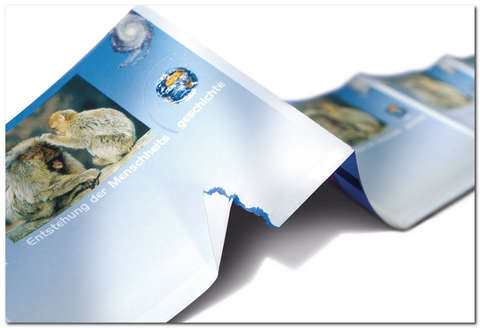
Application example for MH 1484 CCB: Admission tickets
MH 1484 CCB is produced using the proven coating technology of Mitsubishi HiTec Paper. With its uniform matt surface, brilliant colours and individual, personalized printouts are achievable. Designed for use with dye and pigment inks, it is suitable for high-speed inkjet printing as well as for classic large format printing.
![]() MH 1484 CCB is the ideal inkjet paper for tickets to sporting and other events, and also for lotteries and gaming tickets, coupons, vouchers, VIP passes and much more. In short, a universal security solution for sophisticated and individual printing jobs, which opens up potential new applications to digital printers.
MH 1484 CCB is the ideal inkjet paper for tickets to sporting and other events, and also for lotteries and gaming tickets, coupons, vouchers, VIP passes and much more. In short, a universal security solution for sophisticated and individual printing jobs, which opens up potential new applications to digital printers.
Now available exclusively from your Mitsubishi partner.
Renewed FSC® certificate for Södra
Södra has received a renewed forest management certificate for FSC for the next five years. An external audit has been carried out, and more than 60 properties have been reviewed in 2014.
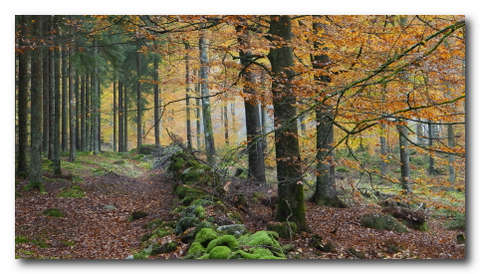
This audit covered all three dimensions in the standard: social issues, the environment and economy.
The FSC® certificate means that forestry is being carried out in accordance with the requirement specified in FSC's forestry standard and that timber can be traced back to the place where it grew. FSC-certified raw materials are in great demand among many customers working with pulp and sawn timber products and interior products.
"We are proud of the efforts of all our members and staff as regards maintaining high levels of both production and environmental initiatives in respect of forestry. This certification acknowledges the work we are doing," says Håkan Larsson, Director of Forestry at Södra.
Södra members have set aside, on average, eight per cent of their forest land for nature conservation purposes as part of the initiative for compliance with the requirements of the certification. This is equivalent to more than 200 000 soccer pitches. Moreover, cutting initiatives in production forests taken into account various conservation values such as dead wood, old trees and valuable small environments.
To achieve certification, social requirements also have to be met in respect of matters such as employment terms, the work environment and outdoor activities.
Södra has been working since 2009 to offer its members the opportunity to certify their forestry in accordance with FSC (Forest Stewardship Council® FSC® CO14930) and PEFC™. Södra has one of the biggest group certificates in the world. A total of 19,000 properties hold FSC certification, covering more than 1.4 million hectares of productive forest land. PEFC includes an even larger area; almost 1.7 million hectares and 22,000 properties.
New generation of fastest high-resolution line-scan cameras
PAPER MASTER: Easy set-up, highly flexible, fast ROI
New generation of fastest high-resolution line-scan cameras to be presented at China International Paper Technology Exhibition 2014
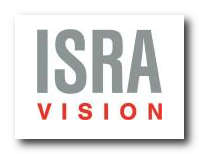 ISRA VISION, the world’s leading supplier of surface inspection systems for the pulp, paper and tissue industry, presents new groundbreaking inspection technology at China International Paper Technology Exhibition 2014. PAPER MASTER Web Inspection System (WIS) guarantees a new precision in detecting and classifying defects. The new generation of fast high-resolution line-scan cameras paired with high-end illumination does not miss out on any defect and is your eyes along the entire production line. Innovative classification software identifies what kind of problem you are dealing with. The result is an unprecedented precision to secure highest possible quality standards.
ISRA VISION, the world’s leading supplier of surface inspection systems for the pulp, paper and tissue industry, presents new groundbreaking inspection technology at China International Paper Technology Exhibition 2014. PAPER MASTER Web Inspection System (WIS) guarantees a new precision in detecting and classifying defects. The new generation of fast high-resolution line-scan cameras paired with high-end illumination does not miss out on any defect and is your eyes along the entire production line. Innovative classification software identifies what kind of problem you are dealing with. The result is an unprecedented precision to secure highest possible quality standards.
This quality step ahead in the automated inspection of all paper and tissue surfaces is made possible by ISRA’s further development of classic web inspection. PAPER MASTER WIS is a ready-to-use solution with the latest, fast, high-resolution cameras, combined with brightest illumination technology. Standard resolutions up to 8000 pixels in CD/camera and 640 MPixels/second true processing speeds deliver highest detection performance for any application. Easily and fast integrated into the production line, PAPER MASTER WIS offers an eight times better resolution than conventional cameras and is able to find all defects even down to microns.
The sophisticated components provide the basis for an ultra-fast and highly precise web inspection. Data processing is performed in real-time, enabling a most reliable high-speed classification. Altogether, the operator receives fully automated results that had not been possible with previously available technology.
Crystal clear images of defects by PAPER MASTER WIS give the basis for accurate defect classification. Even smallest irregularities can be detected and evaluated. Modern classification software identifies and classifies defects in no time. Previously, it took a long time to set up classification systems and teach defects. Today, installation goes fast and easy thanks to ISRA’s defect catalogue that provides basic information to start classification in only a few hours. Quickly accessible, detailed defect information helps to adjust parameters and take actions before it becomes a real problem for production. Further, quality is measured permanently, and producers are now able to make sure that only flawless material is delivered to their customers.
Conclusion: PAPER MASTER WIS is the key to significant improvements to quality. It guarantees high-performance web inspection and enables 100% quality control and decrease in customer claims permanently. With a quick installation, high-performance web inspection and outstanding quality measurement, WIS promises a fast return on investment and highest quality standards with a decrease of quality defects up to 70%.
Valmet to supply first Advantage NTT line in the USA to von Drehle Corporation
von Drehle Corporation will be the first tissue maker in the USA to produce tissue with Valmet's flexible Advantage NTT technology. The new line will be installed at the company's facility in Natchez, Mississippi, USA. Startup of the new line is planned to be in late 2015.
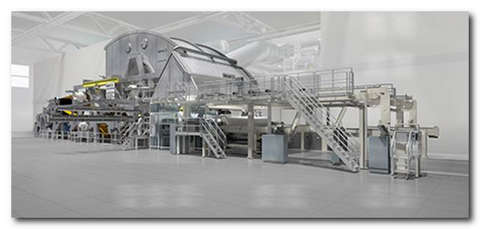
Image: Valmet Advantage NTT tissue machine
The order is included in Valmet's third quarter 2014 orders received. The value of the order is not disclosed.
von Drehle is currently operating two Advantage DCT tissue machines in their Cordova, North Carolina operation. The Advantage NTT technology is designed for maximum flexibility as well as enhanced product quality and can easily swing between productions of conventional tissue to textured tissue in just a few hours. It has been well received by the market and this will be the fourth NTT machine in production. The first Advantage NTT line was started up in Mexico in 2013 and two more lines are planned to be in production in Chile and Abu Dhabi in 2014 and 2015.
"Valmet is one of our long time trusted suppliers. As we studied different tissue machine technologies, energy efficiency, flexibility, and potential for optimizing use of our recycled fiber furnish were critical. Process and operation review made the Valmet NTT technology the obvious choice for production of tissue and towel products at our Natchez, MS Facility," says Joe Pankratz, V.P. of Manufacturing, von Drehle Corporation.
"This will be the first Valmet's Advantage NTT installation in USA and we are all delighted to work with von Drehle in yet another project. We will deliver this project as a showcase in the industry," says Soren Eriksson, Account Sales Manager, Tissue Mills Business Unit, Valmet.
Technical information
The new tissue machine will have a width of 2.6m and a design speed of 2,000 m/min. The raw material for the new line will be recycled fiber and the production line is optimized to save energy and fiber as well as add possibilities for product differentiation and increased capacity of premium quality products.
Valmet's scope of delivery will comprise a complete tissue production line including an Advantage NTT 100HS tissue machine. The tissue machine will be equipped with an OptiFlo headbox and a cast alloy Yankee cylinder. It will also be featured with the Advantage tissue technology including, an AirCap hood and a SoftReel. Basic mill engineering, process equipment and process ventilation are also included in the scope. Furthermore, the delivery will include an automation package from Metso Automation with process control system. Installation supervision, training and commissioning as well as product development support are part of the delivery.
About von Drehle Corporation
von Drehle Corporation, established in 1974, is based in Hickory North Carolina and are currently operating tissue mills in Cordova, Maiden, Memphis and Las Vegas. The company provides quality towel, tissue and dispenser products for the Away From Home market in North America.
